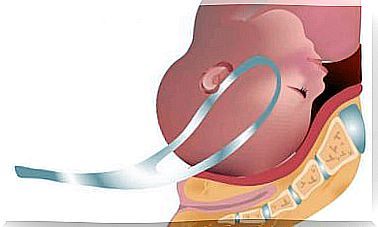Lack Of Amniotic Fluid During Pregnancy

Amniotic fluid protects your young child and creates the living conditions that the fetus needs to be able to develop properly. Lack of amniotic fluid can lead to complications during pregnancy and can have fatal consequences.
In the following article, we will go deeper into what happens when amniotic fluid is in short supply during pregnancy so that you can take the necessary precautions.
What is amniotic fluid deficiency?
Lack of amniotic fluid during pregnancy means that there is not enough volume of amniotic fluid, a condition also known as oligohydramnios.
This condition occurs during an estimated 10 percent of pregnancies, especially during the third trimester of pregnancy.
During an ultrasound, a technician divides the uterus into 4 parts to calculate the amount of fluid.
A normal amount is between 5 and 25 centimeters. If the child has less than 5 cm of fluid, the doctor will diagnose oligohydramnios.
What causes amniotic fluid deficiency?
The medical community is not entirely sure what causes amniotic fluid deficiency during pregnancy.
In most cases, however, it has to do with arterial hypertension, preeclampsia, diabetes and multiple pregnancies.
But the following factors may also play a role:
Rupture of the membrane of the amniotic sac
When the membrane in the amniotic sac ruptures, the amniotic fluid leaks out through the opening. This is especially serious and frequent during the last weeks of pregnancy.
If you notice that your underwear gets wet or if you notice a loss of fluid during pregnancy, contact your doctor immediately.
This complication can expose your little one to infection, so it is best to seek medical help immediately.

2. Various diseases
Other causes of amniotic fluid deficiency are the presence of certain diseases before pregnancy. These include diabetes, high blood pressure, lupus and several others.
Other complications can occur if the mother takes medication to control some of these pre-existing conditions.
In all cases, it is best to let maternity care know about any pre-existing conditions and any prescription medications you are taking during pregnancy.
Congenital defects or disorders of the placenta
A fetus inhales and drinks amniotic fluid and then excretes it. This guarantees the development of the baby’s lungs and gastrointestinal system.
One factor that hinders the fetus’ production of urine is that the placenta loosens.
This condition reduces the transfer of nutrients from the mother to the growing baby, which in turn reduces the amount of urine the baby produces.
Risks related to amniotic fluid deficiency
The risks associated with a lack of amniotic fluid depend on the pregnancy in which it occurs.
A sufficient amount of fluid prevents umbilical cord compression, a condition that prevents the administration of oxygen and nutrients to the fetus.
If this happens, the following circumstances may arise, among others:
- Malformations
- Miscarriage
- Pulmonary hypoplasia or abnormal development of the baby’s lungs
- Reduced growth in utero
Once a medical specialist has diagnosed oligohydramnios, the pregnant mother must go through a series of examinations.
Basically, the purpose of these studies is to determine if the young child is developing well enough.
If the mother is in the last weeks of pregnancy, the doctor will probably induce labor and monitor the baby at all times.

What are the symptoms of amniotic fluid deficiency?
Now that you know the consequences of amniotic fluid deficiency, it is important to pay attention to the following symptoms:
- Lack of fetal movements.
- That fluid leaks through the vagina.
- Decreased uterine growth.
During the regular visits, your midwife decides if your fetus’ growth is too low.
If a lack of amniotic fluid is suspected, it is important to take a bedridden position to avoid complications.
Doctors also recommend that you drink plenty of fluids.
Other treatments may also include medications that stimulate fluid production. Doctors may also recommend a transfusion or injection of fluid through amniocentesis.
Finally, amniotic fluid deficiency can be very serious, so it is important to be aware of any changes.
Visiting your doctor regularly helps ensure that your child is healthy and strong.









